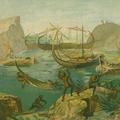Laestrygones
Laestrygonians
Laestrygones
Lestrigones
Laestrygones
Laestrygones
Lestrigones
Lestrygones
Lestrigoni
Laestrygonen
Laestrygones
Laestrígonos
Лестригоны
Лаестригони
Laestrygones
Laestrygonians
Cannibalistic giants
Laestrygoni
Laestrygonians
Laestrygonians
Odysseus and his fleet of ships leave Aeolia and continue their travels.
Odysseus|et|his|classis navium|of|Naves|depart from|||perseverant|eorum|journeys
Ulise|și|al său|flotă|de|nave|pleacă|Aeolia|și|continuă|al lor|călătorii
Odysseus and his fleet of ships leave Aeolus and continue their travels.
オデュッセウスとその船団はエオリアを離れ、旅を続けます。
Odiseu și flota sa de nave părăsesc Aeolia și își continuă călătoriile.
Eventually, on the seventh day of sailing, they reach an island called Telepylus, where the sun rises and sets at strange times.
Tandem|"in"|the|septimo|dies||navigating|"illi"|perveniunt ad|ad insulam|island|vocata|Far Gate City|ubi||sol|"oritur"||goes down||unusual|"horis"
În cele din urmă|în|ziua|a șaptea|zi|de|navigare|ei|ajung|o|insulă|numită|Telepylus|unde|soarele|soarele|răsare|și|apune|la|ciudate|ore
În cele din urmă, în a șaptea zi de navigație, ajung pe o insulă numită Telepylus, unde soarele răsare și apune la ore ciudate.
in Telepylo habitabant Laestrygones.
in|In Telepylos|they lived|Laestrygonians
în|Telepylos|locuiau|Laestrygones
In Telepylo lived Laestrygones.
ラエストリゴン家はテレピュロスに住んでいました。
Лестригоны жили в Телепиле.
În Telepylus locuiau Laestrygones.
Laestrygones erant gigantes.
Laestrygones|erau|giganți
||giants
Лестригоны были гигантами.
Laestrygones erau giganți.
ibi, nox parva erat; dies longus erat.
there|short night|short|||long|
acolo|noapte|mică|era|zi|lung|era
there, the night was a small one; day long.
そこでは夜は短かった。長い一日でした。
там ночь была коротка; это был долгий день.
Acolo, noaptea era mică; ziua era lungă.
igitur, paene semper lux erat.
therefore|almost||light|
deci|aproape|întotdeauna|lumină|era
therefore, that almost always the light in their dwellings.
したがって、ほとんど常に明るい状態でした。
поэтому почти всегда было светло.
Așadar, aproape întotdeauna era lumină.
portus insulae bonus erat.
The port|of the island|good|
port|insulei|bun|era
harbors island was good.
島の港はよかったです。
Порт острова был хорош.
Portul insulei era bun.
nam circum portum saxa alta erant.
for|around|the harbor|"the rocks"|high|
că|în jurul|portului|pietre|înalte|erau
For the tall rocks around the harbor.
港の周りには高い岩があったからです。
ибо вокруг гавани были высокие скалы.
Căci în jurul portului erau stânci înalte.
naves igitur tutae erant.
The ships|"therefore"|"safe"|
nave|așadar|sigure|erau
the ships, therefore, both types were.
したがって船は安全でした。
поэтому корабли были в безопасности.
prin urmare, navele erau în siguranță.
ceteri comites in portum navigabant.
the other companions||||
ceilalți|tovarăși|în|port|navigau
the other companions were sailing into the harbor.
他の仲間たちは港に入っていった。
остальные товарищи плыли в гавань.
ceilalți tovarăși navigau spre port.
ego tamen navem reliqui extra portum.
I|"however"|ship|left|outside of|
eu|totuși|nava|am lăsat|în afara|port
I still left the ship outside the harbor.
しかし、私は港の外に船を降りました。
Я, однако, оставил корабль за пределами порта.
totuși, eu am lăsat nava în afara portului.
deinde, dixi ad tres comites, “inhabitantes invenite,” et misi.
"then" or "next"|I said||three companions|companions|inhabitants|find||"I sent"
apoi|am spus|la|trei|tovarăși|locuitori|găsiți|și|am trimis
Then, I said to the three companions, 'find the inhabitants,' and I sent them.
それから私は三人の伯爵に「住民を見つけてください」と言い、送りました。
Тогда я сказал трем графам: «Найдите жителей», и послал.
apoi, am spus celor trei tovarăși, “găsiți locuitorii,” și am trimis.
comites puellam validam invenerunt.
the companions|the strong girl|strong girl|found
tovarășii|fata|puternică|au găsit
The companions found a strong girl.
仲間たちは強い女の子を見つけた。
Товарищи нашли сильную девушку.
tovarășii au găsit o fată puternică.
puella erat filia Antiphatei, regis Laestrygonum; puella comites duxit ad domum patris.
girl||daughter of Antiphates|of Antiphates|of the king|of the Laestrygonians||companions|led||father's house|of her father
fata|era|fiica|lui Antiphates|rege|Laestrygonilor||tovarășii|a condus|la|casa|tatălui
The girl was the daughter of Antiphates, king of the Laestrygonians; the girl led the companions to her father's house.
その少女はラエストリゴンの王アンティファテスの娘でした。少女は仲間たちを父親の家に連れて行きました。
девушка была дочерью Антифата, царя лестригонов; девушка повела спутников в дом своего отца.
fata era fiica lui Antiphate, regele Laestrygonilor; fata a dus tovarășii la casa tatălui.
ubi domum intraverunt, uxorem Antiphatei viderunt.
"when"|the house|"they entered"|Antiphates' wife|of Antiphates|"saw" or "have seen"
unde|casa|au intrat|soția|lui Antiphates|au văzut
When they entered the house, they saw Antiphateus' wife.
彼らが家に入ると、アンティフェテスの妻が見えました。
когда они вошли в дом, то увидели жену Антифата.
unde au intrat în casă, au văzut soția lui Antiphate.
uxor erat tam magna quam mons.
wife||so|very large|"as"|mountain
soția|era|atât de|mare|cât|munte
it was as important as the wife of a mountain.
彼の妻は山のように偉大でした。
его жена была велика, как гора.
soția era atât de mare cât un munte.
uxor virum vocavit.
wife|her husband|called
soția|pe soț|a chemat
The wife called her husband.
妻は夫に電話した。
жена позвонила мужу.
soția l-a chemat pe soț.
Antiphates statim unum comitum rapuit: consumere volebat.
Antiphates immediately seized|immediately|one of them|one of the companions|seized|devour|"wanted to"
Antiphates|imediat|unul|dintre camarazi|a răpit|a consuma|voia
Antiphates immediately grabbed one of his comrades, wanted to consume.
アンティファテスはすぐに一つの罪を認めた:彼は消費したかった。
Антифат сразу ухватился за одно: он хотел потреблять.
Antiphate a răpit imediat unul dintre tovarăși: voia să-l consume.
ceteri effugerunt ad naves.
"the others"|"escaped to"|to the ships|the ships
ceilalți|au fugit|spre|nave
the rest escaped to the ships.
остальные бежали на корабли.
ceilalți au fugit spre nave.
Antiphates ceteros Laestrygones vocavit.
Antiphates|ceilalți|Laestrygoni|a chemat
|the other Laestrygonians|Laestrygonians|
Antiphates called the rest Laestrygones.
アンティフェイトは残りのラエストリゴンを呼んだ。
Антифат призвал остальных лестригонов.
Antiphates i-a chemat pe ceilalți Laestrygoni.
omnes ex oppido venerunt et circum portum convenerunt.
all||from the town|"they came"||around||gathered around
toți|din|oraș|au venit|și|în jurul|port|s-au adunat
They came therefore and gathered together around the port, from the town, all the.
彼らはみな町からやって来て、港の周りに集まりました。
все они пришли из города и собрались вокруг гавани.
toți au venit din oraș și s-au adunat în jurul portului.
deinde saxa magna in naves iaciebant.
"then" or "next"|large rocks||||"were throwing"
apoi|pietre|mari|în|nave|aruncau
then they lay great stones upon the ships.
それから彼らは船に大きな石を投げました。
затем они забросали корабли большими камнями.
apoi aruncau pietre mari în nave.
gigantes comites sicut pisces reducebant ad domos et consumpserunt.
giants|companions|"like" or "as"|fish|"brought back"||their homes||"they consumed"
uriași|tovarăși|precum|peștii|duceau|la|case|și|au consumat
The giants were bringing back their companions like fish to their homes and consumed them.
巨人たちは伯爵たちを魚のように家に持ち帰り、食べてしまいました。
великаны принесли графов обратно в их дома, как рыбу, и съели их.
giganții, tovarășii, îi duceau ca pe pești în case și i-au consumat.
ego reveni ad navem meam, et clamavi, “fortiter laborate, comites, si vivi effugere cupitis.” effugimus tuti, sed ceteros comites reliquimus mortibus.
I|"I returned"|to||my ship||I shouted|bravely|work hard|companions|if you|"alive"|escape alive|"you desire"|"we escaped safely"|safe and sound||"the other"||left behind|to their deaths
eu|m-am întors|la|nava|mea|și|am strigat|cu putere|lucrați|tovarăși|dacă|să trăiți|să scăpați|doriți|am scăpat|în siguranță|dar|ceilalți|tovarăși|am lăsat|morții
I returned to my ship and shouted, 'Work hard, companions, if you wish to escape alive.' We escaped safely, but we left the other companions to death.
私は船に戻り、「生きて逃げたいなら、頑張ってね、伯爵」と叫びました。私たちは無事に逃げましたが、残りの仲間は死んだままになりました。
Я вернулся на свой корабль и крикнул: «Работайте усердно, графы, если хотите уйти живыми». мы благополучно сбежали, но оставили остальных товарищей мертвыми.
m-am întors la nava mea și am strigat: „munciți cu putere, tovarăși, dacă doriți să scăpați vii.” Am scăpat în siguranță, dar i-am lăsat pe ceilalți tovarăși morții.
SENT_CWT:AFkKFwvL=5.8 PAR_TRANS:gpt-4o-mini=4.2
openai.2025-01-22
ai_request(all=32 err=0.00%) translation(all=26 err=0.00%) cwt(all=179 err=0.56%)

